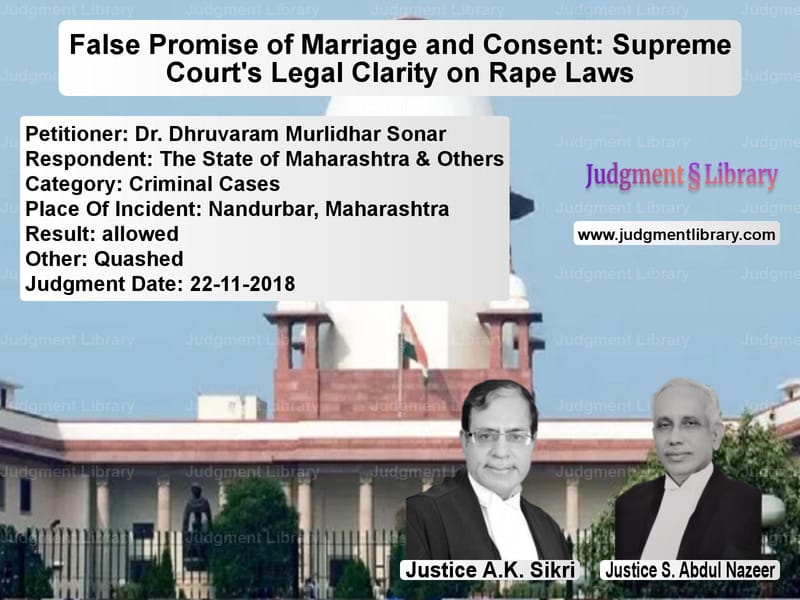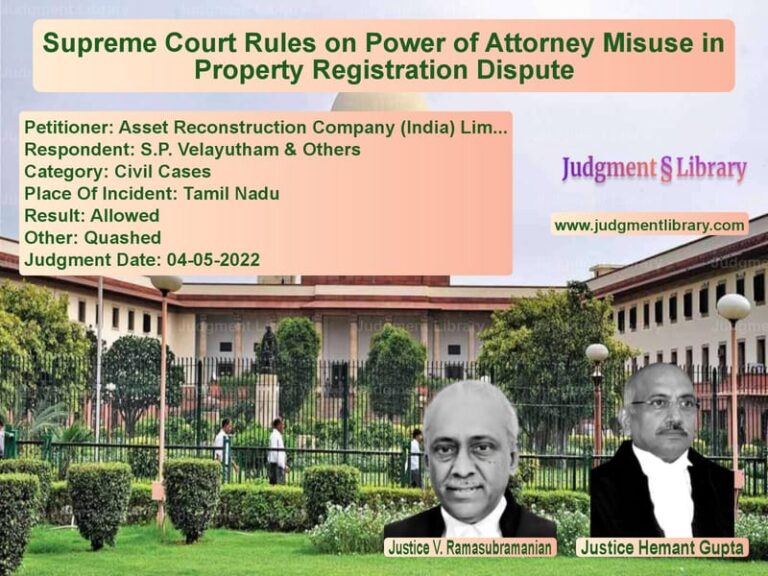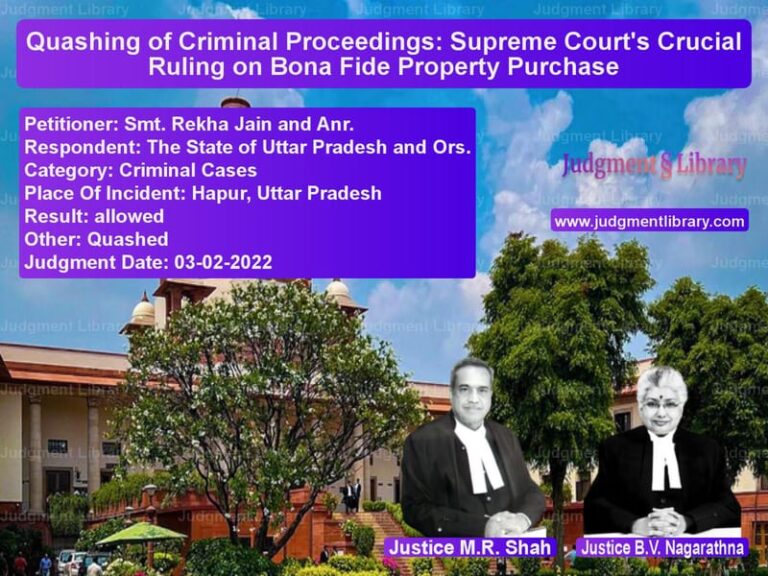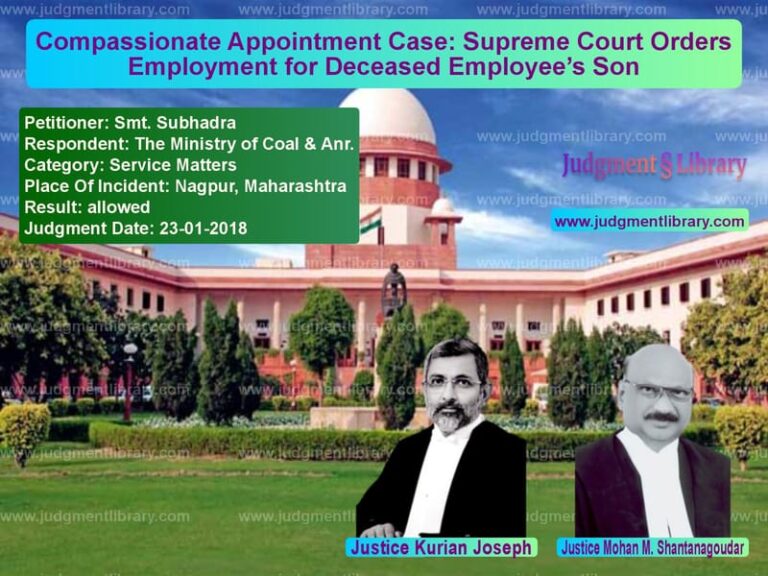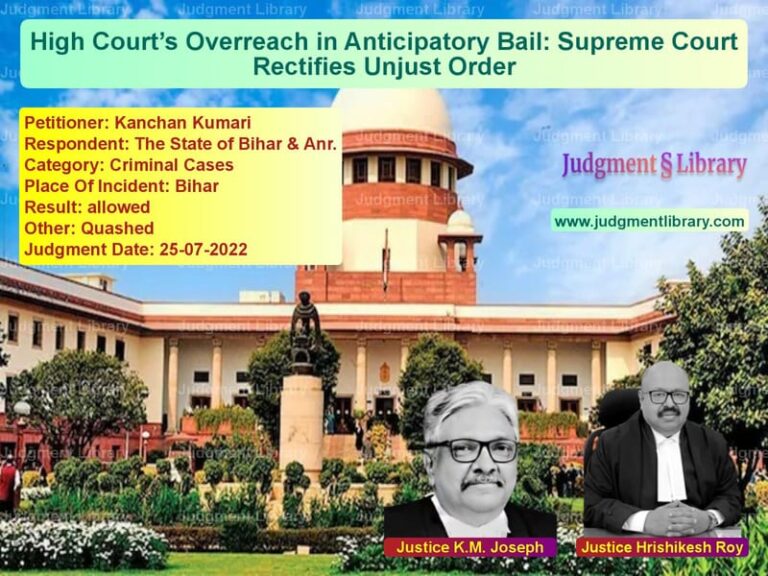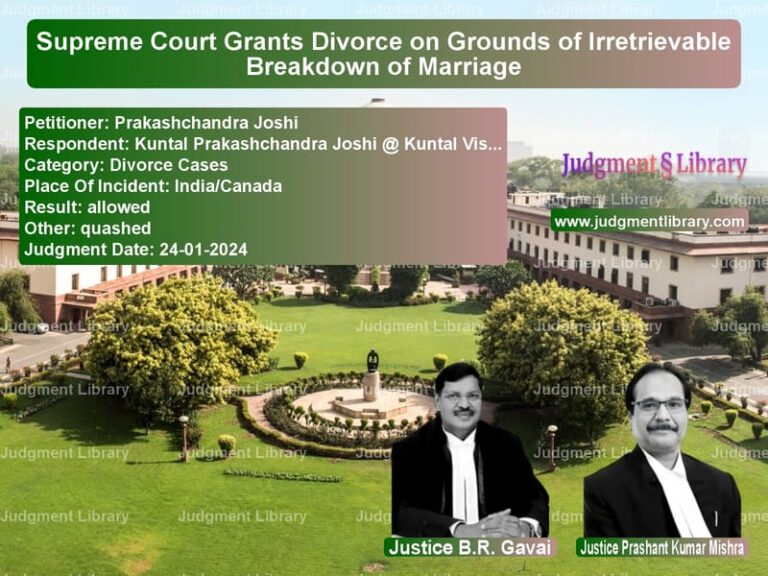False Promise of Marriage and Consent: Supreme Court’s Legal Clarity on Rape Laws
The legal distinction between rape and consensual sex has been a subject of extensive debate, especially when consent is obtained under a promise of marriage. The case of Dr. Dhruvaram Murlidhar Sonar v. The State of Maharashtra & Others presented before the Supreme Court dealt with this crucial question. The Supreme Court had to determine whether an allegation of rape could stand when a woman entered into a consensual relationship based on a promise of marriage that was ultimately not fulfilled.
Background of the Case
The case began with a complaint filed by the respondent, a widow, who had been working as an Assistant Nurse in the Primary Health Centre at Toranmal, Maharashtra. The petitioner, Dr. Sonar, was serving as a Medical Officer at the same establishment. According to the complainant, the petitioner had informed her that he had marital issues and was planning to divorce his wife. Based on this assurance, she entered into a relationship with him, expecting that he would marry her.
She claimed that they lived together, both at his government quarters and at her residence, and maintained a physical relationship. However, she later learned that the petitioner had married another woman, which led her to file a complaint alleging rape under Section 376(2)(b) IPC, cheating under Section 420 IPC, and an offense under the SC/ST (Prevention of Atrocities) Act.
Arguments by the Petitioner
The petitioner, through his counsel, contended that:
- The allegations in the FIR were false and filed with a malicious intent.
- The complainant had voluntarily entered into the relationship, fully aware of his marital status.
- There was no coercion or fraud involved in their relationship.
- The complaint was filed only after he married another woman, which showed a vindictive intent.
It was also argued that even if the allegations in the FIR were taken at face value, they did not make out a case under Section 376 IPC.
Arguments by the Respondent
The respondent countered these arguments by stating:
- The petitioner had misled her into believing that he would marry her.
- She agreed to the relationship based on this assurance, and his failure to marry her constituted an act of deceit.
- Since she belonged to a Scheduled Caste, the petitioner’s actions also attracted the provisions of the SC/ST Act.
Legal Principles Considered by the Supreme Court
The Supreme Court carefully examined the precedents related to cases involving consent obtained under a promise of marriage. The Court referred to previous judgments, including:
- Uday v. State of Karnataka (2003) – In this case, the Court held that if a woman consents to a physical relationship believing in a promise of marriage, and the man later refuses to marry due to external circumstances, it would not amount to rape.
- Deelip Singh v. State of Bihar (2005) – The Court distinguished between breach of a promise and a false promise, stating that only a deliberately false promise to marry could be treated as an act of fraud.
- Deepak Gulati v. State of Haryana (2013) – The Court observed that if the accused had mala fide intentions and knew from the outset that he would not marry the complainant, then it could amount to rape.
Supreme Court’s Observations
After carefully analyzing the facts and legal precedents, the Supreme Court made the following crucial observations:
“There is a clear distinction between rape and consensual sex. The court must carefully examine whether the accused had mala fide intentions and made a false promise to satisfy his lust, as the latter falls within the ambit of cheating or deception.”
The Court emphasized the difference between a false promise made with deceitful intent and a mere failure to keep a promise. It stated:
“If the accused had honest intentions at the time of entering into the relationship but was later unable to marry due to circumstances beyond his control, then it cannot be treated as rape.”
Final Judgment
The Supreme Court concluded that the allegations in the FIR did not constitute the offense of rape. It held that:
- The complainant had entered into a consensual relationship with full knowledge of the facts.
- The petitioner did not obtain consent fraudulently or under coercion.
- There was no evidence that the petitioner had no intention of marrying the complainant from the beginning.
- The mere failure to marry does not constitute rape.
Consequently, the Supreme Court set aside the Bombay High Court’s order and quashed the FIR. The petitioner’s appeal was allowed, reinforcing the principle that false promises must be distinguished from broken promises.
Petitioner Name: Dr. Dhruvaram Murlidhar Sonar.Respondent Name: The State of Maharashtra & Others.Judgment By: Justice A.K. Sikri, Justice S. Abdul Nazeer.Place Of Incident: Nandurbar, Maharashtra.Judgment Date: 22-11-2018.
Don’t miss out on the full details! Download the complete judgment in PDF format below and gain valuable insights instantly!
Download Judgment: Dr. Dhruvaram Murlid vs The State of Maharas Supreme Court of India Judgment Dated 22-11-2018.pdf
Direct Downlaod Judgment: Direct downlaod this Judgment
See all petitions in Rape Cases
See all petitions in SC/ST Act Case
See all petitions in Judgment by A.K. Sikri
See all petitions in Judgment by S. Abdul Nazeer
See all petitions in allowed
See all petitions in Quashed
See all petitions in supreme court of India judgments November 2018
See all petitions in 2018 judgments
See all posts in Criminal Cases Category
See all allowed petitions in Criminal Cases Category
See all Dismissed petitions in Criminal Cases Category
See all partially allowed petitions in Criminal Cases Category

